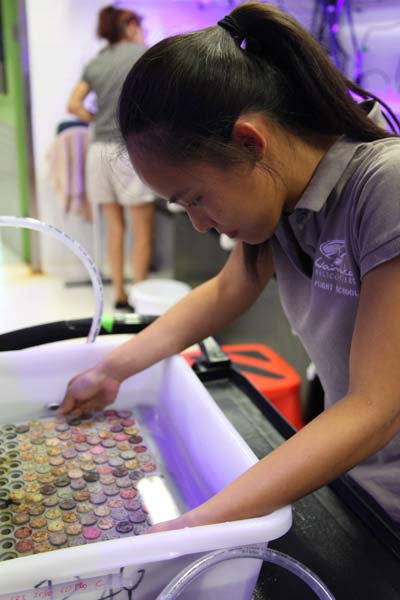Wing Chan: Our oceans, our future
Oceans produce over half of the world's oxygen and absorb 50 times more carbon dioxide than our atmosphere. Within them are coral reefs that contain some of the most diverse ecosystems on the planet, and provide habitats and shelter for a host of marine organisms. They also protect coastlines from the damaging effects of wave action and storms. Now, it is up to us to protect them.
Dr Wing Chan, a postdoctoral researcher of the University of Melbourne, researches coral reef restoration and conservation, and ocean warming and acidification. Wing is also passionate about science outreach and sharing her love of the ocean. Read her reflections below.
Conserving the underwater world
Corals are fascinating and coral reefs are home to countless marine lives. The persistence of coral reefs is vital to the many marine species that are dependent on them.
I had the privilege to explore this underwater world when I was a kid and I believe every child in the future should also have the right to do so.
We are stewards of the environment, and it is our responsibility to hand over the world to the next generation in, at the very least, the same state as when we received it.
Improving climate resilience
 My PhD project examined if we are able to improve coral climate resilience via hybridization.
My PhD project examined if we are able to improve coral climate resilience via hybridization.
My current project complements this by looking at potential tools to improve coral climate resilience, this time focusing on the microalgae that live inside corals. Compared to corals, these microalgae have a relatively fast evolutionary rate and can potentially be harnessed to assist corals with climate resilience.
These microalgae have been isolated from corals and challenged with progressively higher temperatures for over four years to develop heat tolerance. My postdoctoral project investigates if we can introduce these heat-tolerant microalgae back to the corals to enhance their bleaching tolerance.
The most exciting moment in my research so far was witnessing baby hybrid corals grow into mature adult corals. These hybrid corals were produced in an experiment in 2015, and some hybrid corals survived better and grew faster than purebred corals. This is very exciting for coral reef conservation!
These baby corals are now adults, meaning we will (hopefully) be able study second-generation hybrids in detail for the first time.
Engaging the community
Science can have a much greater impact through communication and engagement with the wider community. It is critically important that science and the society are connected.
While there are many techniques that can make communication more effective, I believe the single most important thing in science communication is to speak from your heart.
I enjoy reading inspiring stories during difficult times. A recent favorite of mine is the National Geography film “The Hope”, about Dr Jane Goodall’s inspiring works on primate research as well as science communication and education.
Small steps to stem climate change
Climate change is one of the greatest threats to the survival of coral reefs and everyone can make a difference in reducing our carbon footprint.
The future of our oceans lies in our hands. We are very powerful collectively: little lifestyle changes made by every individual can decarbonize our future.
Simple changes that we can make are biking to work, shopping with sustainable, local providers, and switching power off at the source.